The rock band manager who swapped success for kangaroos
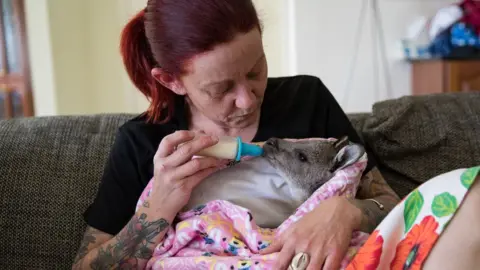 Peter Sharp, Tame & Wild Studio
Peter Sharp, Tame & Wild StudioAs a new documentary reignites debate about the kangaroo meat industry, the film has an unlikely ally in a former high-flying band manager. Rae Harvey explains her new life's mission to reporter Jenny Valentish.
It didn't feel like the most fortuitous day when Rae Harvey hit a possum in a 50km/h (30mph) zone in Victoria, Australia. The possum was long gone, but a frog sound turned out to be its joey. Wrapping it in her jumper, Ms Harvey called Wildlife Victoria, who directed her to a local carer.
That moment, though she didn't know it yet, was her road to Damascus.
The tough-as-nails (she would argue "passionate") manager was more used to wrangling musicians than wildlife. She established Crucial Music in 1995 as a touring company, bringing American acts such as Blink 182 and NOFX to Australia.
By 2002 the company had morphed into artist management, with her roster including Gyroscope, Children Collide, rappers 360 and Pez. Her longest association has been with The Living End, whose arena anthems have earned them six ARIAs - Australia's top music awards - and multi-platinum status.
Now Ms Harvey is selling off her personal memorabilia - alongside items donated from others in the music industry - to fund Wild2Free, the wildlife shelter she runs with partner Sayo Prentic in Bega Valley, New South Wales.
The first auction, which took place on Friday, included one of those ARIA awards. Ms Harvey has packed up her Melbourne office, now just focusing on The Living End, surrounded by animal nutrition formula and pillow-case pouches, rather than platinum discs.
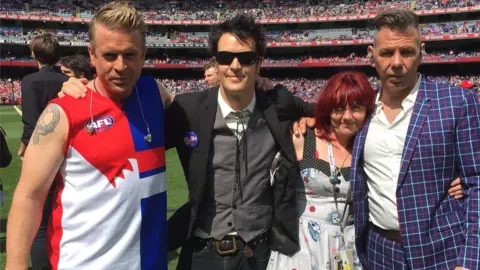 Supplied
SuppliedOriginally, the couple had planned to slowly set up the wildlife sanctuary while still working full time, but then a fire gutted their new property.
"We were extremely calm whilst watching the house burn to the ground," she marvels. "I'd lost my life's work in the hard drives in the office, but we had the animals safe in the car with us and we had our lives. We just shrugged and said: 'Okay, we're starting again from scratch.'"
The Living End put on a benefit gig, and music industry figures helped promote an online fundraising page. Thanks to these efforts and the insurance money, Ms Harvey was able to kit out a smaller property with the basics and - sooner than she had intended - has swapped late nights for early starts, caring for vulnerable eastern grey kangaroos.
At their busiest, Mr Prentic will go to bed at 04:30 and Ms Harvey starts her shift half an hour later.
"I wish that Australians had the slightest bit of insight into how special this animal is," she says, trying to explain the sacrifices she's made.
"They're not like any other. They are emotional, sensitive, individual. They thrive on love. But let's be honest - a lot of Australians don't care."
That's also the premise of a new documentary, which opened in selected cinemas in Australia this week, called Kangaroo.
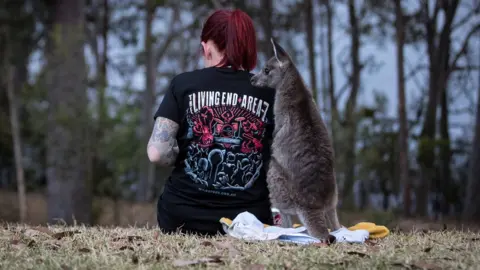 Peter Sharp, Tame & Wild Studio
Peter Sharp, Tame & Wild StudioLocal filmmakers Michael McIntyre and Kate McIntyre Clere set out to explore Australia's love-hate relationship with the animal; such as the use of the kangaroo as the emblem of Qantas and sporting teams, versus the attitude that the animal is a pest and a commodity.
The film has faced accusations that it is against the kangaroo meat industry. The Kangaroo Industry Association of Australia (KIAA), which supports 2,000 licensed "harvesters", has responded with a statement addressing points made by the film, with seven points being labelled as false, five as partly true and two as true.
Tony Mahar, chief executive of the National Farmer's Association, told Sky News: "The Kangaroo documentary is naive at best and offensive at worst… it's ridiculous to say kangaroos in Australia are endangered." He conceded that there were populations on the eastern coast and coastal areas that "we might need to look at".
More on the kangaroo debate:
Certainly Kangaroo has been more rapturously received in the US (where it has sold out premieres in New York and Los Angeles, and has been widely reviewed) than in Australia.
Seeing a kangaroo in the wild is topmost of any tourist's to-do list. Whereas Australians have frequently cast kangaroos in sinister or bloody roles - such as in Wake In Fright, Snowtown, Wolf Creek 2, Welcome to Woop Woop, Alice to Nowhere, Razorback and Crocodile Dundee - international audiences often prefer feel-good fodder, such as Skippy the Bush Kangaroo.
So Ms Harvey tries to appeal to an international audience. On Instagram she tells detailed stories of the animals and uses multiple hashtags to come up in as many global searches as possible.
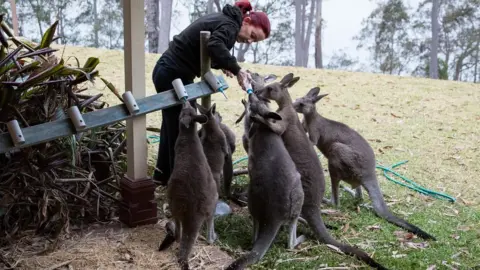 Peter Sharp, Tame & Wild Studio
Peter Sharp, Tame & Wild StudioOn Facebook, she'll do the odd advertisement and post videos, which are sometimes picked up by other sites and go viral. The stressful life of animal rescue isn't usually compatible with expert marketing, but as you'd expect from a music industry veteran, Ms Harvey has a few tricks up her sleeve.
In particular, a sponsorship scheme - in which donors are sent a personalised email from their animal - has taken off. Ms Harvey and Mr Prentic document the kangaroos they have released, and provide a post-mortem for those that died, educating the public on parasitic diseases such as coccidiosis and babesiosis.
She says it's not unusual for a kangaroo to arrive at the shelter suffering from myopathy, a result of being chased by dogs or running from shooters. It's a stress-related degradation of the muscles, which then turn rancid.
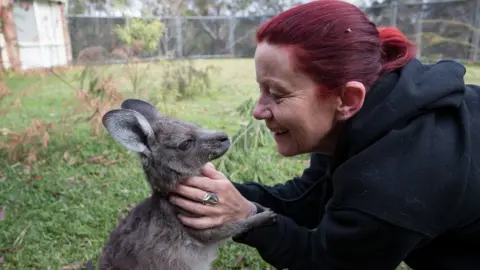 Peter Sharp, Tame & Wild Studio
Peter Sharp, Tame & Wild StudioIt means that, for Harvey, generating local support is a hard slog. Government funding for shelters is capped at A$3,000 a year, so she relies heavily on fundraising.
She admits she's probably known in former circles as the crazy kangaroo lady. "Have I lost friends?" she queries, with typical candour. "Probably. Do I care? No."
Jenny Valentish is a freelance writer based in the Goldfields region of Victoria.
